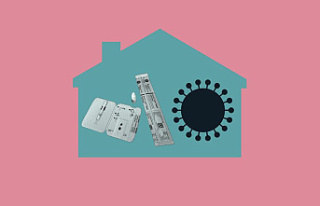WASHINGTON, Inflation is beginning to look more like an unwelcome houseguest who won't let go.
Many economists have been reiterating the reassuring message for months that a spike of consumer prices, which had been absent in the U.S. for several generations, would not last long. It would be "transitory", in the words of Jerome Powell, Federal Reserve Chair, and White House officials as the economy moved from virus-related chaos into something closer to normal.
However, anyone who has purchased a carton or gallon of gasoline, or used a car, can tell you that inflation has set in. Economists now have a more disconcerting message. They predict that higher prices will continue to rise well into next year, perhaps even beyond.
The government announced Wednesday that its consumer price index rose 6.2% from one year ago, marking the largest 12-month jump since 1990.
Jason Furman, the Obama administration's top economic advisor, said that "it's a big blow against the transitory narration." "Inflation is not slowing down. It is maintaining a rapid pace.
The sticker shock is affecting the areas families feel it most. For example, at the breakfast table: Bacon prices have risen 20% in the last year and egg prices by nearly 12%. The price of gasoline has risen 50%. A washer or dryer will cost you 15% more than it did a year ago. Pre-owned cars are 26% more. Get 26% more.
While wages are rising sharply for many workers it isn’t enough to keep pace with the increasing prices. After accounting for inflation, the average hourly wage in the United States fell 1.2% last month compared to October 2020.
Wells Fargo economists joke that the Labor Department's CPI (the Consumer Price Index) should be spelled "Consumer Pain Index" because it coincides with consumers' higher spending right before the holidays.
The Fed is under increasing pressure to move away from years of easy money policies and shift faster. It is a threat for President Joe Biden and congressional Democrats, as well as their ambitious spending plans.
___
WHAT CAUSED THE PRICE PIKES?
It is often the opposite of great news. The spring 2020 collapse of the U.S. economy was caused by COVID-19. Lockdowns were in effect and businesses had to close or reduce their hours. Consumers stayed home as a precautionary measure. Employers slashed 22 million jobs. In the April-June quarter of last year, economic output fell at an unprecedented 31% annual rate.
All of us are ready for more misery. Companies cut investment. Stockpiling was delayed. The result was a severe recession.
Instead of succumbing to a prolonged downturn the economy forged an unexpectedly strong recovery thanks to massive government spending and a slew of emergency moves taken by the Fed. The rollout of vaccines encouraged consumers to return to bars, restaurants and shops by spring.
Businesses had to react quickly to the sudden surge in demand. They could not hire fast enough to fill job openings (a record 10.4 millions in August) or purchase enough supplies to fulfill customer orders. Ports and freight yards were unable to handle the increased traffic as business boomed. The global supply chain became choked.
The costs rose. Companies realized that they could pass on higher costs to consumers by raising prices. Many of these consumers had saved a lot during the pandemic.
Furman, an economist at Harvard Kennedy School, stated that "a substantial chunk of the inflation we see is the inevitable consequence of coming out of a pandemic."
Furman suggested that misguided policies played a part, however. Furman said that policymakers were so determined to prevent an economic collapse, they "systematically underestimated inflation."
"They put kerosene on fire."
Furman stated that the economy was overstimulated by a flood of government spending, including President Joe Biden’s $1.9 trillion coronavirus relief program, which includes $1,400 checks to all households in March.
He noted that inflation is much higher in the United States than in Europe. "Europe is experiencing the same supply shocks and the same supply chain problems as the United States. They didn't provide nearly as much stimulus.
Biden made a statement Wednesday acknowledging that inflation hurts Americans' pockets and that reversing the trend was a top priority for him. However, he stated that his $1 trillion infrastructure package would help to ease supply shortages. This includes spending on roads, bridges, and ports.
___
WHAT PERIOD WILL IT LAST?
As long as companies are unable to meet the demand of consumers for goods and services, consumer price inflation will continue. Americans are able to continue to spend on everything, from new cars to lawn furniture, because of a resurgent labor market. Employers have added 5.8million jobs this year. The supply chain bottlenecks are not showing any signs of easing.
Rick Rieder is chief investment officer for global fixed-income at Blackrock. He says that "the demand side of the U.S. economic will continue to be something you will behold" and "companies will continue having the luxury of passing through price."
Megan Greene is the chief economist at Kroll Institute. She suggested that inflation and overall economic conditions will eventually return to normal.
She said that inflation would be "transitory" because she believes it. "But economists must be honest about what is transitory. I believe this could last another one year."
Furman stated, "We need to be humble about how long this will last." It's going to be with us for a while, I think. Although the inflation rate will slow down after this year's record-breaking pace, it will still be extremely high relative to historical norms.
___
WILL WE BE SUFFERING A RETURN TO 1970'S-STYLE "STAGFLATION"?
A return to 1970s "stagflation" has been a possibility due to an increase in consumer prices. This was the time when high prices were accompanied by high unemployment, contrary to what economists believed was possible.
However, today's reality is very different. The unemployment rate is low and overall, households are financially well-off. According to the Conference Board, a business research organization, consumers' inflation expectations for last month were at their highest level since July 2008. However, consumers weren't all that concerned: The confidence index of the board rose despite this optimism regarding the job market.
Lynn Franco, senior director of economic indicators at the Conference Board, stated that for the moment, "for the time being, at most, they feel like the benefits outweigh the negatives."
After slowing in July and September due to the highly contagious Delta variant, economic growth is expected to rebound in the last quarter of 2021.
Greene stated that most economists expect growth to accelerate in fourth quarter. It doesn't mean that we are facing both a slowdown in growth and higher inflation. We are just experiencing higher inflation."
___
WHAT SHOULD POLICYMAKERS DO?
The Fed is under pressure to keep inflation down and control prices.
Furman stated that they need to stop telling us inflation is temporary, and instead start being more concerned about inflation, and then act in a way consistent with being anxious. "We have seen some of that, but not enough."
Powell announced that the Fed would reduce the monthly bond purchases it started last year in an emergency effort to boost the economy. Fed officials predicted in September that the benchmark interest rate would be raised from near zero to record levels by 2022, which was much sooner than they had anticipated a few months ago.
However, if inflation continues to rise, the Fed might be forced to accelerate its rate increase; investors can expect at least two Fed Rate hikes next year.
"We have been fighting non-existent inflation for the past 20 years," Diane Swonk (chief economist at Grant Thornton's accounting and consulting firm Grant Thornton), said. "Now we are talking about fighting real inflation."












